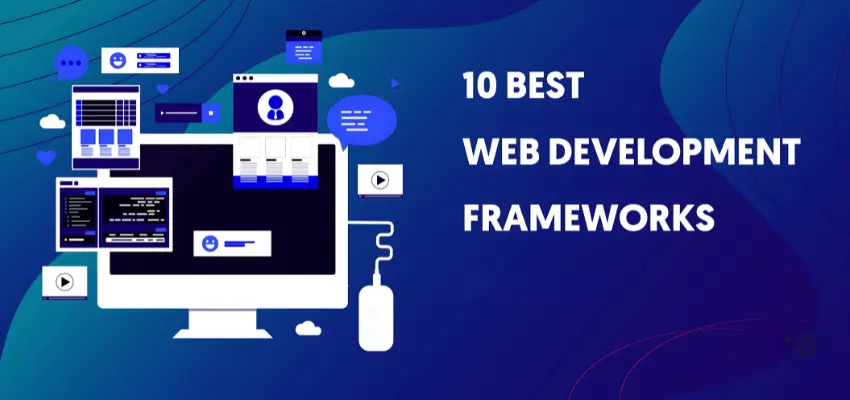Think about your favorite website, the one you keep going back to. Have you ever wondered what makes it so smooth, fast, and user-friendly? It’s not just great design; it’s built on powerful web frameworks that make everything work seamlessly.
If you’re a developer (or aspiring to be one), choosing the right framework can make a huge difference in your career. But with so many options out there, where do you start? Let’s break down the top web frameworks in 2025 and how you can use them to build your future in web development.

A web framework is a software platform that simplifies the development of websites, web applications, and web APIs. It provides prewritten code, templates, and components, helping developers save time and reduce errors.
Web frameworks are categorized into two types:
- Frontend frameworks – Focus on user interface and experience.
- Backend frameworks – Handle server-side processes and functionality.
Both play a crucial role in creating smooth, efficient, and visually appealing web applications.
Web frameworks offer multiple advantages, including:
Faster development – Prebuilt tools and libraries speed up coding.
Easier maintenance – Standardized code simplifies updates and debugging.
Enhanced security – Built-in security features help prevent vulnerabilities.
Improved scalability – Frameworks support growing user demands.
Now, let’s dive into the top web frameworks you should learn in 2025.
1. jQuery (Frontend)
A lightweight JavaScript framework, jQuery simplifies animations, event handling, and DOM manipulation. However, it may face debugging challenges.
Used by: Twitter, WordPress, Bank of America
2. React (Frontend)
An open-source JavaScript library developed by Meta, React is perfect for creating interactive user interfaces, particularly for single-page applications (SPAs).
Used by: Facebook, Netflix, Airbnb
3. Ember (Frontend & Backend)
A powerful JavaScript framework, Ember supports modern web applications but has a steep learning curve.
Used by: LinkedIn, Discourse, Apple Music
4. Ruby on Rails (Backend)
A high-speed web framework, Ruby on Rails is 10x faster than traditional Java frameworks. It’s ideal for database-driven applications.
Used by: GitHub, Shopify, Airbnb
5. Django (Backend)
A Python-based framework, Django is fast, secure, and scalable, making it a top choice for enterprise applications.
Used by: Instagram, Pinterest, Spotify
6. Angular (Frontend)
Developed by Google, Angular is a JavaScript-based framework for building high-performance web applications.
Used by: Upwork, Netflix, PayPal
7. ASP.NET (Backend)
A Microsoft-developed framework, ASP.NET enables the creation of dynamic, high-performance applications using C#.
Used by: Stack Overflow, Taco Bell, Getty Images
8. Laravel (Backend)
A PHP-based MVC framework, Laravel is known for simplicity, elegance, and powerful API support.
Used by: Deltanet, Travel, Neighbourhood
9. Meteor (Frontend & Backend)
Meteor is a real-time JavaScript framework that enables rapid cross-platform development.
Used by: WishPool, Telescope, HaggleMate
10. Express (Backend)
A minimal yet powerful backend framework for Node.js, Express is widely used in server-side development.
Used by: Uber, Accenture, Myntra
11. Spring (Backend)
A Java-based framework, Spring is widely used in enterprise software development and cloud computing.
Used by: MIT, Zillow, Mascus
12. Play (Backend)
A high-performance Java & Scala framework, Play follows the MVC architecture and supports hot code reloading.
Used by: LinkedIn, Coursera, LendUp
13. Vue.js (Frontend)
A flexible JavaScript framework for single-page applications with an easy-to-use API.
Used by: Grammarly, GitLab, Behance
Reduced development time – Prebuilt components make coding faster.
Better debugging – Frameworks simplify error detection.
Easier maintenance – Clean code structure improves long-term upkeep.
Security enhancements – Built-in protections against common threats.
Lower costs – Efficient development reduces expenses.
- Single-Page Architecture – Ideal for simple web pages with dynamic content.
- Microservices Architecture – Breaks applications into smaller, independent services for scalability.
- Serverless Architecture – Focuses on cloud-based applications with reduced infrastructure management.
Mastering different architectures allows developers to optimize performance and build career opportunities.
1. Learn the Fundamentals
Start with HTML, CSS, and JavaScript to build a solid foundation.
2. Pick a Framework
Choose frontend, backend, or full-stack frameworks based on your interest.
3. Gain Hands-On Experience
Work on real-world projects, contribute to open-source or build a portfolio.
4. Get Certified
Enroll in a web development certification program to enhance your skills.
5. Apply for Jobs
Look for roles as a Frontend Developer, Backend Developer, or Full-Stack Developer.
Pro Tip: Certifications like the Post Graduate Program in Full Stack Development from Simplilearn can boost your job prospects!
1. What is the best web framework for beginners?
Django, Angular, and Express are great for beginners due to their simplicity and strong community support.
2. Which web frameworks are in high demand?
React, jQuery, and Angular lead the job market in 2024.
3. Is HTML a web framework?
No, HTML is a markup language, not a framework. However, many web frameworks use HTML.
4. Which is the easiest framework to learn?
Flask, Django, and Vue.js are among the easiest to learn and have great documentation.
5. What are the best web development certifications?
Courses from Simplilearn, Udemy, Coursera, and Google Developers offer valuable certifications.
Final Thoughts
Web frameworks are essential for modern web development, making the process efficient, secure, and scalable. Whether you’re a beginner or an experienced developer, learning the right frameworks can accelerate your career growth.